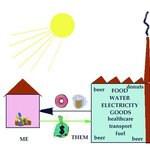
For the sake of argument
Argument - a discussion for the purpose of making something clear.
Sake - benefit.
To introduce an idea 'for the sake of argument' does not mean bringing up an idea to provoke a flaming row. It means introducing an idea into a discussion for the betterment of the process of making something clear.
Is that clear now?
Right! I don't want to hear any more arguments about it.
Credit:
Tip of the hat to the letter Aitch




